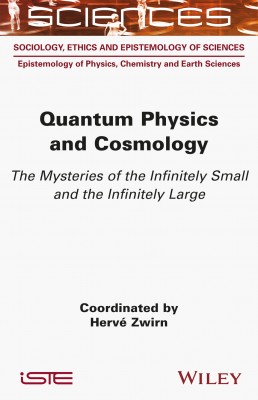
Fascinating discoveries have been made in recent years in the fields of the infinitely large and the infinitely small, and unexpected connections have emerged between these previously independent domains. Quantum physics, which challenges the way we conceive the reality around us, contributes to our attempt at understanding the greatest mysteries of cosmology on the scale of the Universe as a whole.
Recent astronomical observations, made with increasingly powerful instruments, have led us to understand that only 5% of what constitutes the Universe is known to us. Understanding the remaining 95% leads us to use quantum physics, which seems to indicate that the world around us is not as real as it intuitively appears to be.
Quantum Physics and Cosmology presents, in as accessible a manner as possible, the state of the art in these various scientific fields.
1. A Brief Introduction to Quantum Mechanics and a Review of Interpretations, Hervé Zwirn.
2. Bohrian Realism, Thomas Ryckman.
3. The Many-worlds View of Quantum Mechanics, Lev Vaidman.
4. Probability in Everett, Jeffrey A. Barrett.
5. Quantum Theory from a Pragmatist Perspective, Richard Healey.
6. The Role of the Observer: Convivial Solipsism, Hervé Zwirn.
7. Copenhagenish Interpretations of Quantum Mechanics, David Schmid, Yìlè Y?ng et Matthew S. Leifer.
8. Dark Energy, Nathalie Palanque-Delabrouille.
9. Dark Matter, Françoise Combes.
10. Gravitational Waves, Matteo Barsuglia et Simone Mastrogiovanni.
11. What is the Energy of the Vacuum?, Bruno Mansoulié.
12. Temporality in Relativistic Space–time, Marc Lachièze-Rey.
13. A History of Thought Experiments in Quantum Gravity, Thiago Hartz et Olival Freire Junior.
14. Possibility in Physics, Baptiste Le Bihan, Emilia Margoni et Annica Vieser.
Hervé Zwirn is a physicist and epistemologist. He is currently Research Associate at the Centre Borelli of the École Normale Supérieure de Paris-Saclay and the Institut d’Histoire et de Philosophie des Sciences, Paris, France. His research focuses on the foundations of quantum physics and complex systems.